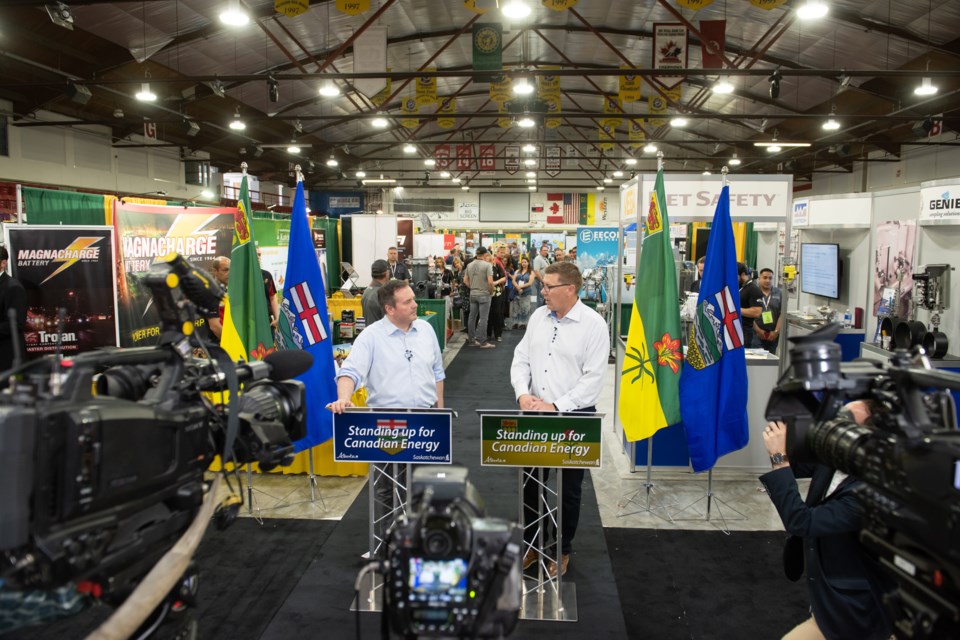Weyburn – During their joint press conference on the floor of the Saskatchewan Oil and Gas Show in Weyburn on June 5, Alberta Premier Jason Kenney and Saskatchewan Premier Scott Moe took questions on energy policy. Pipeline News asked about coal-fired power generation, and its role with carbon capture and storage (CCS) in enhanced oil recovery (EOR), and on a national energy corridor.
Pipeline News: Premier Kenney, Saskatchewan has been capturing carbon dioxide for five years about 60 miles down the road at Estevan, and they’re injecting it here, for enhanced oil recovery, in Weyburn. Now, the previous Alberta government said they want to shut down your entire coal industry. What are you going to do? Are you going to bring in CCS (carbon capture and storage) to revive that coal industry, and are you going to use it for enhanced oil recovery?
Jason Kenney: The answer is we will be repealing the NDP legislation that prematurely shut down our coal industry. Our focus will be on reliable and affordable energy that helps us to grow the economy, create jobs and diversify the economy. Affordable power prices are a key part of that recipe.
Now, having said that, the federal government has imposed its own timelines for shutting down coal plants. Should this federal government get re-elected, that will be a very serious legal challenge.
Secondly, a lot of the coal-fired power producers in Alberta took compensation from the previous government in order to shut down their plants or convert them to natural gas co-gen. In the long run, I think that’s a good thing. But we will not be mandating, under Alberta law, that they do so by 2030. Now, I am open to the carbon capture and storage technology. The challenge is the cost has still proven to be very high. But I understand there’s also been some hopeful improvements in the technology. So I’m looking forward into getting technical advice, whether CCS can be part of our climate leadership strategy. We will be imposing a levy on major industrial emissions, and releasing a number of other measures this fall, and we are keeping an open mind on whether CCS will be a part of that.
Pipeline News: Both of you have referenced the national energy corridor that’s been gaining a lot of traction recently. The obvious site would be the TransCanada right-of-way for Energy East. It’s been studied to death already. What sort of timeline would you like to see for a national energy corridor? Okay, take what TransCanada’s done, the assessment’s already been done, or are you going to spend another five years assessing another right-of-way?
Scott Moe: I think the first conversation we actually need to have, probably at the premiers’ level as we enter this spring and summer, is the conversation around actually having a nation-building, national energy corridor, here in this nation, so we’re actually able to achieve the value of the products we are producing; not just in Western Canada, but in other areas of the nation. As I’ve said, we have Manitoba and Quebec that have landlocked electricity, some of the cleanest electricity available. We have some of the most sustainable energy products, here, in Western Canada, that are being really put on the rails, constraining the capacity we have to export from our two provinces, and others, Manitoba and Ontario, some of the most sustainable agrifood products in the world.
This is really a doing of our own making, in this nation, if you will. We need a much more mature discussion about how do we get these products, these very, very sustainable products to markets around the world. That is fully the conversation we need to have before we start talking about where is the route, and how that is going to work. We need this nation-building project to move forward.
Kenney: Absolutely. And I want to thank Scott for his leadership on this. He has put the idea of resource corridors on the national agenda of the Council of the Federation this summer. I’m going to be down in Quebec, talking to Premier (François) Legault, as well as Atlantic premiers about this next week.
I think this is picking up momentum. Just this week, the leader of the federal of opposition, Mr. Scheer, gave a major speech, supporting the concept of a resources corridor. So we see more and more governments and parties coming onside. I hope that at your COF meeting in Saskatoon, we can move the ball forward.
Moe: Absolutely.



